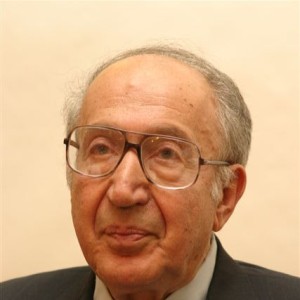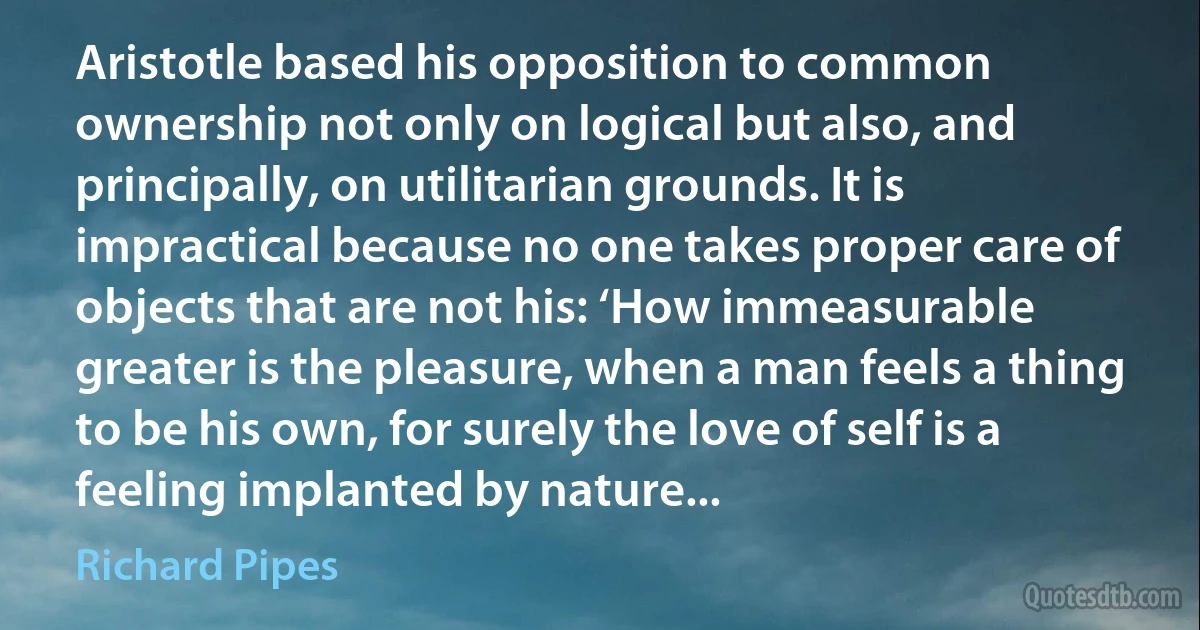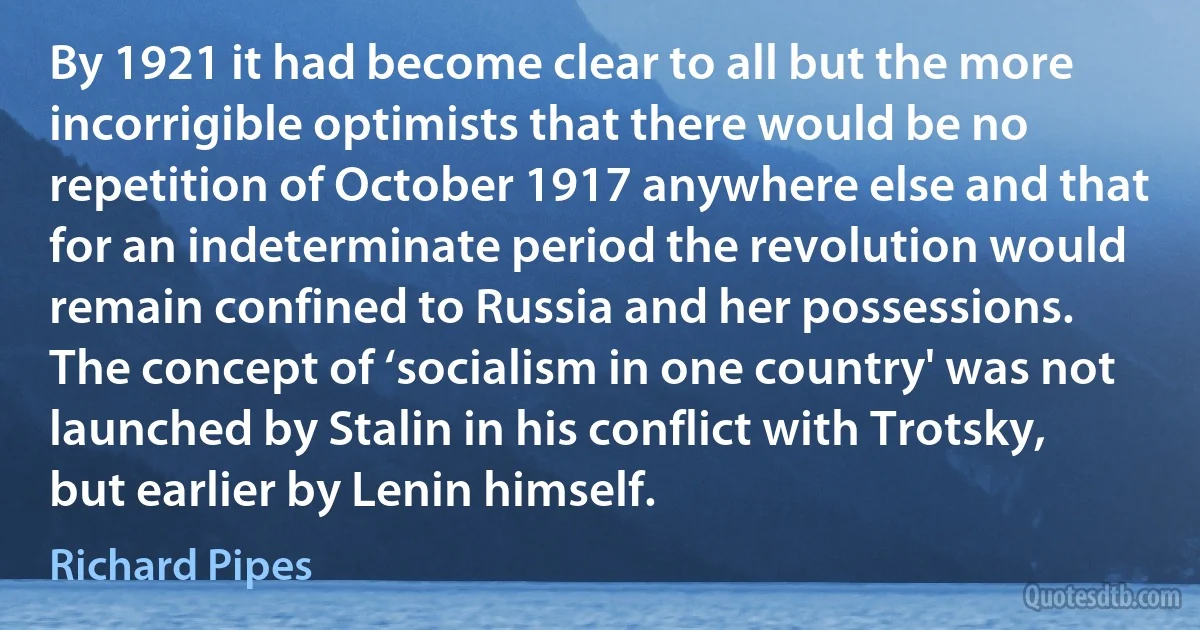Richard Pipes quotes - page 2
The French Jacobins were the first to realize the political potential of class resentment. Exploiting it, they conjured constant conspiracies by aristocrats and other enemies of the revolution: shortly before their fall they drafted legislation expropriating private wealth and had the unmistakable communistic implications. It was from the study of the French Revolution that its aftermath that Marx formulated the theory of class struggle as the dominant feature of history. In his theory, social antagonism was for the first time accorded moral legitimacy: hate, which Judaism condemned as self-destructive, and Christianity (in the guise of anger) treated as one of the cardinal sins, was made into a virtue.

Richard Pipes
The party which Lenin forged and led was really not a party, in the customary sense of the word. It was more of an ‘order,' in the sense in which Hitler called his National-Socialist Party ‘ein Orden,' bound by the members' unshakable loyalty to their leader and one another, but subject to no other principle and responsible to no other constituency. Genuine political parties strive to enlarge their membership, whereas these pseudo-parties-the Bolshevik one first, and the Fascist and the Nazi ones later-were exclusive in that they treated membership as a privilege, restricting it to persons who met certain ideological as well as class or racial criteria. Elements regarded as unworthy were purged.

Richard Pipes
The collapse of the Soviet Union, a state which appeared as solidly entrenched to us as the tsarist Empire did in its day, was not triggered by social unrest: there were no strike waves, no massive demonstrations, no widespread violence. The USSR disintegrated because of political decisions made at the top.

Richard Pipes
No prominent European socialist before World War I resembled Lenin more closely than Benito Mussolini. Like Lenin, he headed the antirevisionist wing of the country's Socialist Party; like him, he believed that the worker was not by nature a revolutionary and had to be prodded to radical action by an intellectual elite.

Richard Pipes
Studying Russian history from the West European perspective, one also becomes conscious of the effect that the absence of feudalism had on Russia. Feudalism had created in the West networks of economic and political institutions that served the central state, once it replaced the feudal system, as a source of social support and relative stability. Russia knew no feudalism in the traditional sense of the word, since, after the emergence of the Muscovite monarchy in the fifteenth and sixteenth centuries, all landowners were tenants-in-chief of the Crown, and subinfeudation was unknown. As a result, all power was concentrated in the Crown.

Richard Pipes
The main Roman contribution to the idea of property lay in the realm of law. Roman jurists were the first to formulate the concept of absolute private ownership, which they called dominium... Roman jurisprudence went to great lengths to stipulate every conceivable nuance of property rights: how acquired and how lost, how transferred, how sold. The rights implicit in dominium were so absolute that ancient Rome knew nothing of eminent domain.

Richard Pipes
For historians of the left even to raise the question of affinities between Soviet Communism and ‘Fascism' is tantamount to conceding the possibility of a causal relationship. Since ‘Fascism' for them is by definition the antithesis of socialism and Communism, no such affinities can be admitted and the sources of ‘Fascism' must be sought exclusively in conservative ideas and capitalist practices. In the Soviet Union this trend went so far the under Lenin, Stalin and their immediate successor, it was forbidden to use the term "National Socialist.”.

Richard Pipes
Within a month of taking control of the German government, the Nazis suspended constitutional guarantees of the inviolability of private property. Property was to be respected, but only as long as the owner used it for the benefit of the nation and state: in the words of a Nazi theorist, ‘[P]roperty was... no longer a private affair but a kind of State concession, limited by the condition that it be put to ‘correct' use.

Richard Pipes
Aristotle argues, possessions enable men to rise to a higher ethical level by giving them the opportunity to be generous: ‘liberality consists in the use which is made of property'-an argument which would greatly appeal to Christian theologians of the Middle Ages. Aristotle's preferred regime was one founded on a middle class, with an equitable distribution of assets.

Richard Pipes
The third factor inhibiting inquiries into the influence of Bolshevism on Fascism and National Socialism was the insistence of Moscow on banishing from the vocabulary of ‘progressive' thought the adjective ‘totalitarian' in favor of ‘Fascist' to describe all anti-Communist movements and regimes.

Richard Pipes
In 1925, Goebbels and Strasser argued in the Nazi daily, Völkischer Beobachter, that only the introduction of a ‘socialist dictatorship' could save Germany from chaos. ‘Lenin scarified Marx.' Goebbels wrote, ‘and in return gave Russia freedom.' Of his own Nazi Party, he wrote in 1929 that it was a party of ‘revolutionary socialists.

Richard Pipes
The economic policies of Mussolini's Italy and Hitler's Germany resembled the ‘state socialism' which Lenin wanted to institute in Soviet Union upon coming to power, under which private enterprise would work for the government-an idea Lenin was force to abandon under the pressure of the ‘Left Communists'.

Richard Pipes
The Empire was traditionally run by a bureaucracy and a gentry, after 1880 reinforced by a political-police organization. This political policing was a Russian invention; Russia was the first country to have two police systems, one to protect the state from its citizens, and the other to protect the citizens from each other. Subsequently, this dual structure became a fundamental feature of totalitarian states.

Richard Pipes
[T]he view that anti-Communism equals Fascism remained obligatory in countries subject to Communist censorship until the advent of Mikhail Gorbachev's glasnost. It was prevalent also in foreign ‘progressive' circles. Western scholars who had the temerity to link Mussolini or Hitler with Communism in any way or to depict their regimes as genuine mass movements risked verbal or other forms of harassment.

Richard Pipes
Richard Pipes
 Occupation: Academic
Occupation: Academic
Born: July 11, 1923
Died: May 17, 2018
Quotes count: 46


![[Mussolini] was not a theoretician but a tactician, whose intellectual eclecticism, a blend of anarchism and Marxism, as well as his emphasis on violence, resembled the ideology of the Russian Socialists-Revolutionaries. (Richard Pipes)](https://cdn.quotesdtb.com/img/quotes_images_webp/97/richard-pipes-anarchism-blend-958697.webp)









